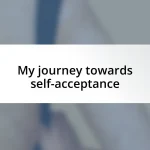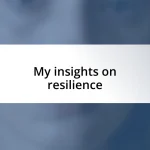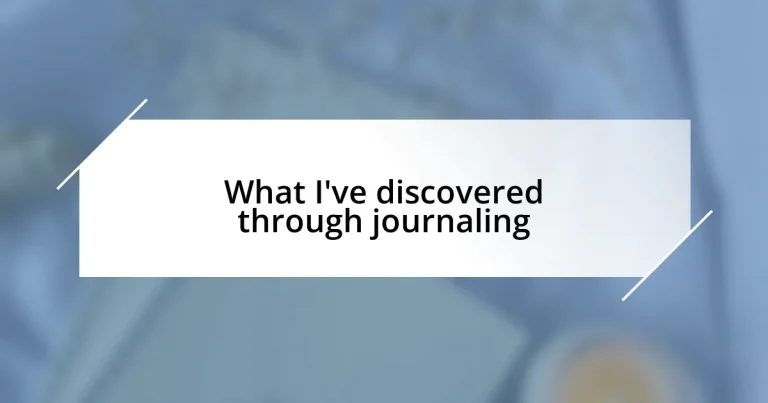Key takeaways:
- Journaling offers clarity, sparks creativity, and fosters emotional healing by allowing introspection and processing of thoughts and feelings.
- It enhances self-reflection by revealing behavior patterns, tracking personal growth, and providing insights that often go unnoticed in daily life.
- Using journaling techniques such as free writing, prompts, and gratitude lists promotes deeper self-awareness and can guide personal development.
- Incorporating journaling into daily routines, even for short periods, serves as a mindfulness practice that improves mental clarity and emotional well-being.
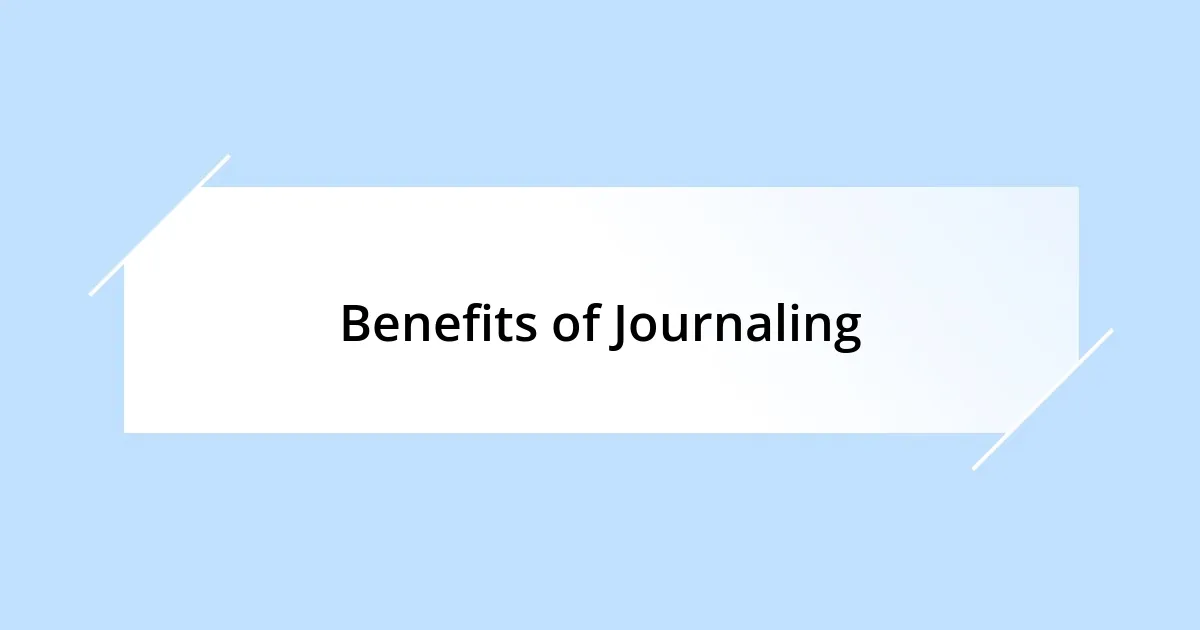
Benefits of Journaling
Journaling is a profound way to gain clarity and insight into our thoughts and emotions. I remember a time when I felt overwhelmed, and pouring my feelings onto the page offered unexpected relief. Have you ever experienced the chaos of your mind quieting down as soon as you began writing? It’s remarkable how surfacing those thoughts allows us to understand ourselves better.
Another benefit I’ve discovered is how journaling can spark creativity. I often find myself struck by inspiration when reflecting on my day or writing about a challenge I faced. It’s almost as if the act of writing unlocks parts of my brain that were previously dormant. Have you noticed how ideas flow more freely once you scribble down your initial thoughts?
Lastly, I’ve realized that journaling fosters emotional healing. When I reflect on past experiences, I can see how I’ve grown or what still needs to be addressed. It’s a safe space to explore feelings that might otherwise be difficult to confront. How often do we give ourselves permission to process our emotions? Writing has given me that space, making it a powerful tool for personal growth.
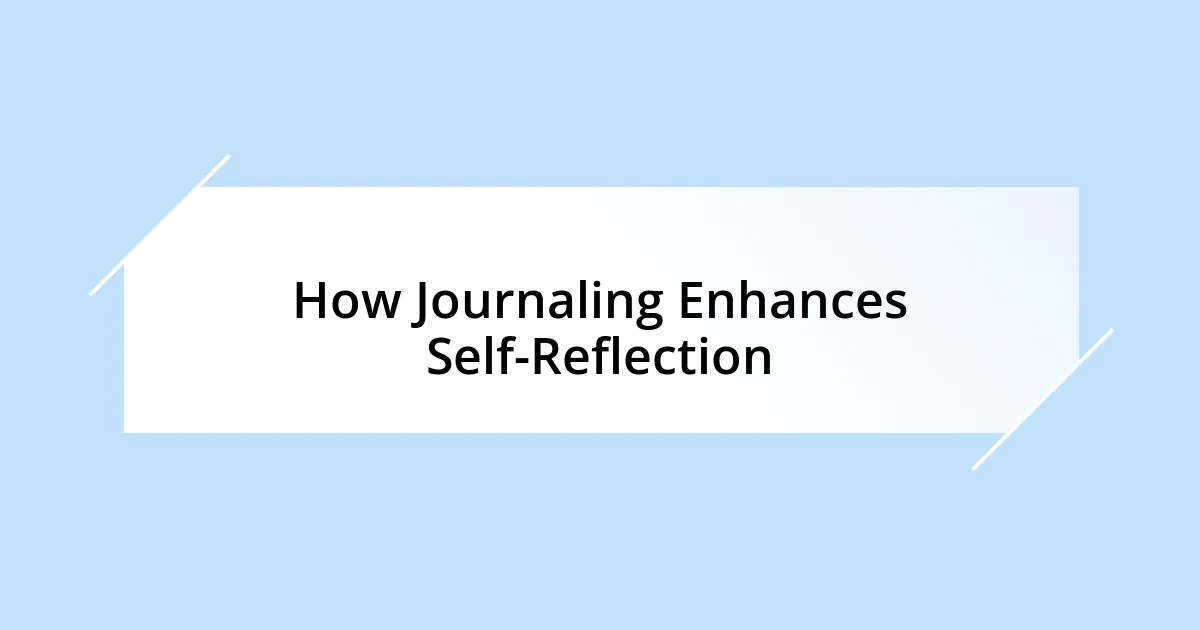
How Journaling Enhances Self-Reflection
Journaling acts as a mirror, reflecting back our innermost thoughts and feelings. I remember the first time I started writing about my day’s events; it felt like giving a voice to parts of myself that I often silenced. Each entry revealed something new, whether it was a recurring concern or a joyful moment I might have overlooked. Isn’t it fascinating how, in that quiet space, we find insights that the hurried pace of life often forces us to ignore?
Furthermore, I’ve found that revisiting past journal entries can be enlightening. It’s like flipping through a photo album of my emotional landscape. One day, I stumbled upon a page from months ago where I had chronicled a difficult decision. Reading those words brought back the fears I felt, but also the strength I developed. It made me realize how far I’d come, and I couldn’t help but feel a sense of accomplishment. Have you ever been surprised by how your perspective on a situation can change over time?
Finally, self-reflection through journaling uncovers patterns in our behavior that we might not notice in daily life. I once engaged in a writing exercise where I tracked my reactions during stressful moments for a week. The insights were shocking! I began to see how often I would avoid confrontation or dive headlong into anxiety. This awareness has since empowered me to take conscious action in my interactions. Isn’t it transformative to see ourselves through a different lens and take steps toward growth?
| Aspect of Journaling | Benefit for Self-Reflection |
|---|---|
| Clarifies Thoughts | Brings awareness to feelings and ideas, creating mental order. |
| Tracks Personal Growth | Allows comparison of past and present, highlighting progress in emotional resilience. |
| Uncovers Behavior Patterns | Reveals repetitive behaviors, enabling proactive changes for personal development. |
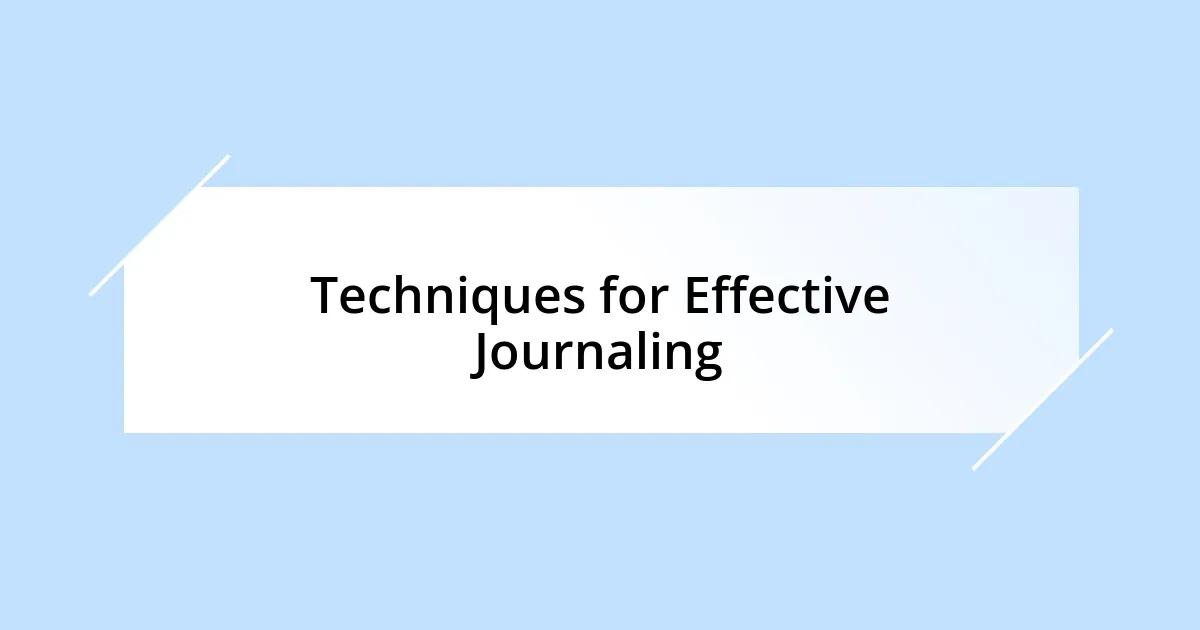
Techniques for Effective Journaling
When it comes to effective journaling, I’ve found that embracing a flexible approach can lead to profound insights. Instead of rigidly following prompts every day, I sometimes let my intuition guide me. This practice has led me to discoveries I might have missed otherwise, including unearthing feelings I didn’t initially recognize. It’s a gentle reminder that the journaling process doesn’t have to fit a mold; rather, it can be an organic exploration of my thoughts.
Here are some techniques I’ve embraced to enhance my journaling practice:
- Free Writing: I set a timer for 10 minutes and write continuously, allowing my thoughts to flow without judgment.
- Prompt Exploration: Occasionally, I pick a prompt that resonates with me, like “What made me smile today?” This leads to uplifting reflections.
- Gratitude Lists: A simple list of things I’m thankful for helps shift my focus and cultivates positivity.
- Emotional Check-Ins: I note my current emotions and what might have triggered them, which helps deepen my self-awareness.
- Creative Expression: I sometimes incorporate doodles or sketches that represent my emotions—this mixes art with words, providing a richer experience.
In addition to various techniques, I think there’s immense value in consistency. I remember when I committed to journaling at the same time each evening. The routine created a comforting space for reflection. Knowing that I had that time set aside for myself made it easier to explore my mind’s complexities. It’s almost like having a date with my thoughts, where I could unravel the threads of my day without distractions.
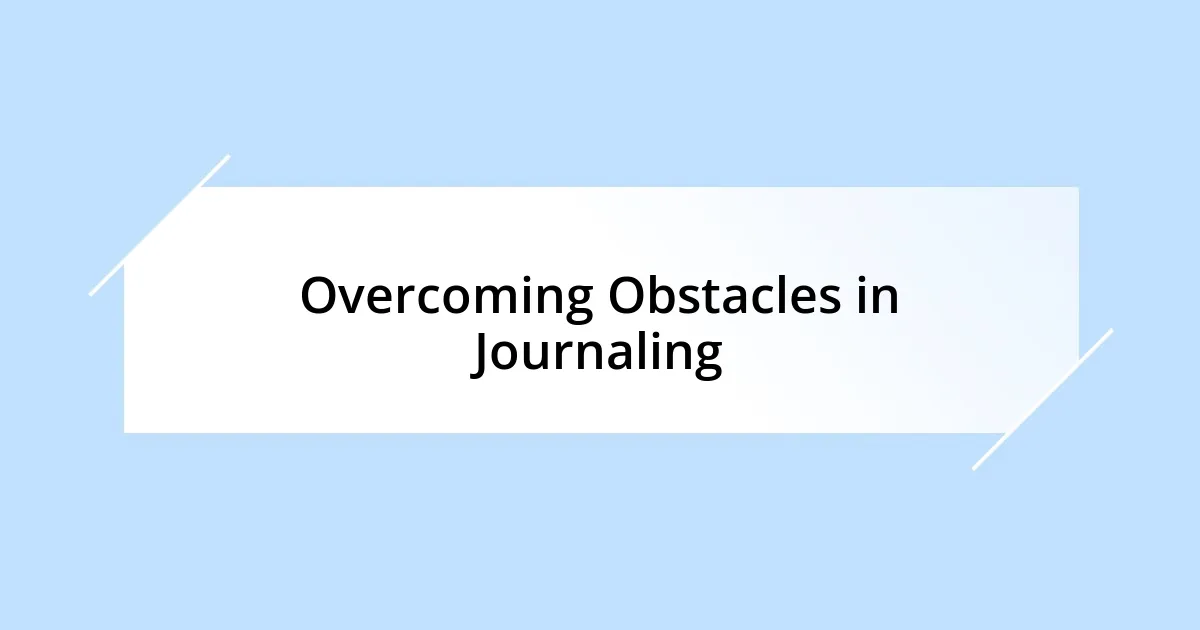
Overcoming Obstacles in Journaling
Sometimes, the biggest obstacle in journaling is the pressure to write something profound. I remember a week when the words just wouldn’t flow—I felt paralyzed by my own expectations. It dawned on me that I didn’t need to craft masterpieces; simply putting pen to paper, even if it was just a list of mundane events, was still valuable. Have you ever felt that weight on your shoulders? It really helped to remind myself that even the smallest reflections matter—they’re stepping stones to deeper thoughts.
Another challenge I’ve faced is overcoming the fear of judgment. Early on, I worried about someone finding my journal and reading my raw emotions. To cope, I started writing with the understanding that this space belongs entirely to me. I made a promise to myself: no one else’s opinion mattered here. This shift in mindset has been liberating. Do you feel protective over your personal writings? It’s all about creating a trusting environment where honesty can flourish.
Then there are moments when life gets busy and journaling seems to slip through the cracks. I used to beat myself up over missed days, but I learned to approach this differently. Instead of viewing it as failure, I now see gaps as opportunities to reflect on what kept me away. For instance, during a hectic work project, I realized my journal could serve as a “pause button” for my thoughts. Have you considered what would happen if you treated skipping a day as a chance to acknowledge your busy life rather than a setback? It’s all part of the journey.

Using Prompts for Deeper Insights
Using prompts in my journaling practice has been a game changer for me. I recall a particular day when I chose the prompt, “What is my biggest fear?” At first, I hesitated, but as I wrote, I found myself uncovering layers of anxiety I hadn’t consciously acknowledged. It was as if the prompt acted as a key, unlocking hidden aspects of my psyche that needed exploration. Have you ever had a moment like that, where a simple question opened up a flood of understanding?
I also love revisiting my favorite prompts during tough times. For example, when I was feeling particularly overwhelmed, I picked the prompt, “What does self-care look like for me?” This led to realizations about my needs—like prioritizing quiet time or indulging in a good book. It struck me then how prompts not only serve as mirrors reflecting our current state but also guide us towards what we truly need to nurture our souls. Isn’t it fascinating how just a few words can steer us toward clarity?
Through regular use, I’ve discovered that the right prompts can act like a bridge into deeper self-awareness. One memorable session, I chose “What legacy do I wish to leave?” As I poured out my thoughts, I was surprised by the emotional weight of my answers. This one prompt revealed not only my aspirations but also fears about not fulfilling those dreams. It made me realize how prompts can do more than just spark reflections; they can illuminate our purpose, bringing a sense of direction to our chaotic lives. Have you found prompts that resonate with your core values? They’re like little guides, pushing us gently toward profound realizations.
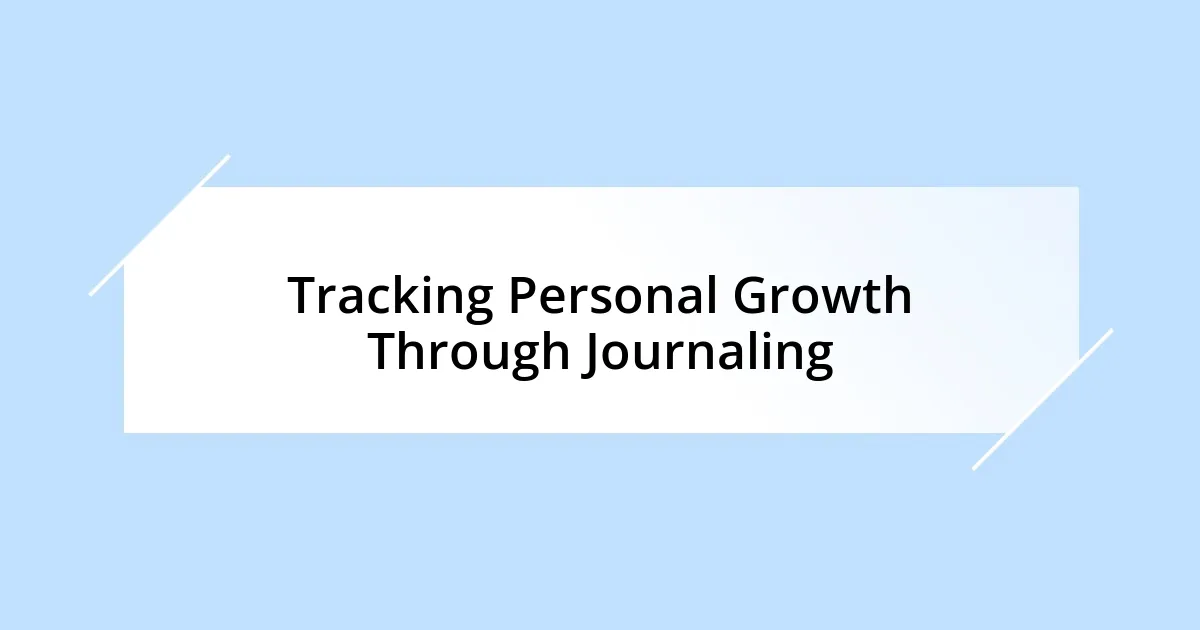
Tracking Personal Growth Through Journaling
Tracking my personal growth through journaling has been a profoundly revealing journey. There were times when I’d flip back through my entries and notice a clear evolution in my thoughts and feelings. For instance, I distinctly remember the first time I wrote about my insecurities. I was in a raw space, overwhelmed and uncertain. Re-reading that entry months later was eye-opening; I realized those fears had transformed into something actionable. Have you ever felt that kind of shift? It’s as if the journal serves as a mirror that reflects not just where I am, but also paths I’ve taken to get to a healthier mindset.
I’ve found that reflecting on past entries also brings clarity to my progress. Often, I’d encounter past goals scribbled in the margins, targets I had long forgotten about. One day, I stumbled upon a note where I resolved to prioritize my mental well-being. It felt like a revelation, making me appreciate how far I’ve come in cultivating a balanced life. In that moment, I couldn’t help but wonder: how many of us overlook our own resilience? Journaling has shown me that personal growth isn’t always loud or flashy; sometimes, it’s subtle, building steadily beneath the surface.
The act of journaling itself has become a ritual that grounds me. I’ve noticed patterns in my reactions to challenges over the years, reflecting on how I’ve learned to approach adversity with more grace and thoughtfulness. For instance, when I faced a tough breakup, my entries revealed a shift from despair to hope. I wrote about feeling shattered but eventually emerging stronger and more self-aware. Have you ever tracked your emotional responses like this? It’s through this lens that I see journaling as not just a habit, but a faithful companion that documents the beautiful, messy nuances of growth and discovery.
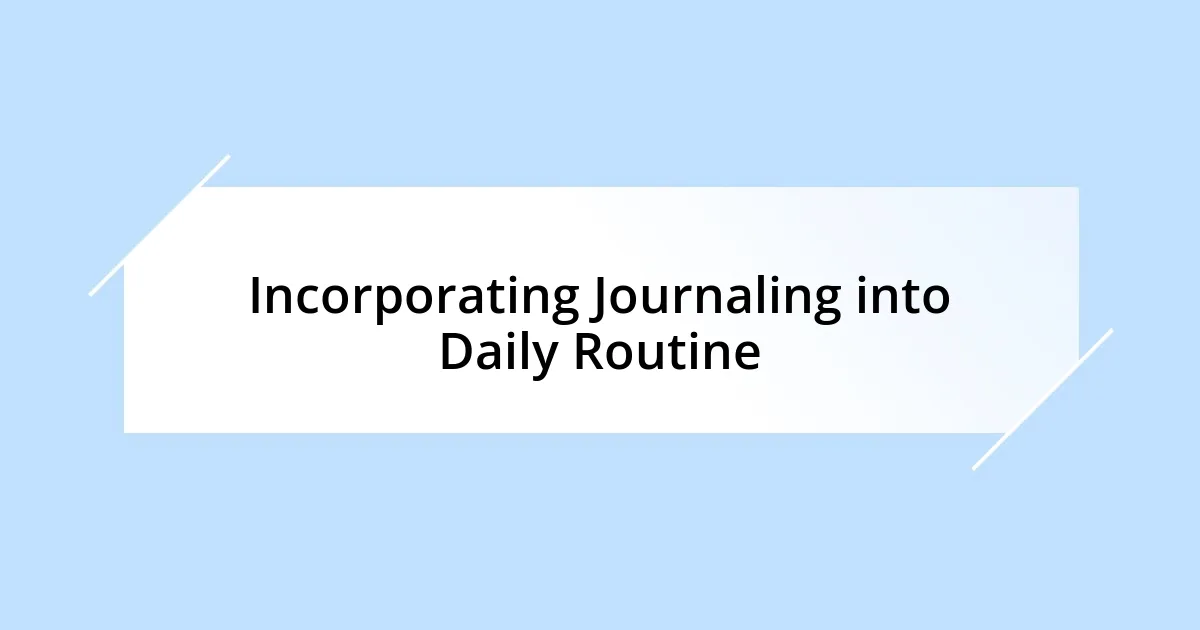
Incorporating Journaling into Daily Routine
Incorporating journaling into my daily routine has transformed how I approach my day. I’ve found that setting aside just ten minutes each morning to jot down my thoughts allows me to start with clarity and intention. It’s that quiet moment before the world rushes in, where I check in with myself. Have you ever tried beginning your day with such a pause? It’s eye-opening how much that brief reflection can set the tone for everything that follows.
On particularly hectic days, I’ve embraced journaling as a form of mindfulness. A few weeks ago, during a busy week at work, I took a moment to write in the middle of the afternoon. As I scrawled down my feelings of stress and overwhelm, I began to unravel what was truly causing my anxiety. I realized I was exhausting myself by trying to maintain too many responsibilities at once. In that instant of reflection, I made a plan to delegate some tasks. Isn’t it amazing how clearing your mind can lead to actionable insights?
Sometimes, I even use journaling as a way to unwind before bed. Instead of scrolling through my phone, which only adds to my racing thoughts, I write down three things I’m grateful for from my day. This simple ritual not only helps me sleep better but also cultivates a positive mindset. Have you ever experienced a shift in perspective just by reflecting on the good parts of your day? It’s a small practice that builds a sense of peace and gratitude that stays with me long after the pen is put down.








